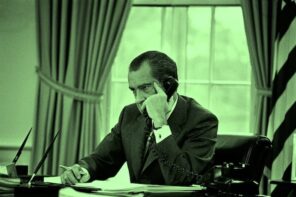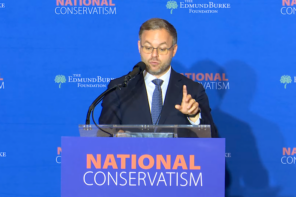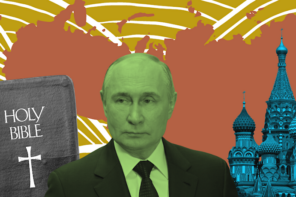U.S. voters gave Donald Trump enough electoral college votes to win the presidential election even though more voters cast their ballots for Hillary Clinton. Religious Right leaders worked hard to generate overwhelming support for Trump among white evangelicals; he has promised to nominate right-wing Supreme Court justices and named anti-gay activists to his transition team, signaling that LGBT people worldwide will lose the U.S. government as an advocate for their human rights at a time when U.S. Religious Right leaders have joined anti-gay regimes in a damaging international backlash to LGBT human rights. BuzzFeed’s Lester Feder explores the devastating impact a Trump administration could have on the global human rights framework.
Trump’s victory comes as countries like Russia and Qatar have been waging a campaign to undermine the foundations of international human rights law, arguing that the framework has become a tool of wealthy, Western nations to impose “cultural imperialism” around the world. For them, the United States is the biggest offender, and its defense of LGBT people is the most potent evidence to question the legitimacy of the entire premise of “human rights.” That is why they’re so afraid of President Trump.
“To me this is not a regular election at all,” said Polina Andrianova, an LGBT activist in St. Petersburg who was a key figure in protesting Russia’s “gay propaganda law” ahead of the 2014 Olympics in Sochi. “For me it is really about fundamental values — values of respect for human dignity and for human life… I’m afraid not just for LGBT people, but where [Trump is] going to take the entire world.”
It’s not clear exactly what Trump’s position on LGBT rights abroad will be once he assumes the presidency — and he’s sent mixed messages about LGBT rights in the US — but the signals he’s sent are not encouraging to advocates who want the US to continue to be a voice for human rights. He has praised totalitarian leaders like Vladimir Putin and derided multinational institutions from the European Union to NATO.
One area he has been clear on, however, is shutting down the US refugee resettlement program, and there are now roughly 1,000 queer refugees from countries like Syria and Iran currently waiting to be resettled from Turkey, said Neil Grungras of the LGBT refugee organization ORAM….
But activists in countries where US support has been critical to promoting LGBT rights say they are afraid more broadly that a Trump victory could tacitly encourage governments with weak commitments to human rights or democracy.
“I don’t think he’d be able to hold our leaders accountable or uphold American values abroad,” said Clare Byarugaba, who co-chaired the coalition of groups in Uganda that fought the sweeping Anti-Homosexuality Act passed in 2014. Opposition to the bill from the US and other nations that help fund Uganda’s government is credited with help ensuring that a suit against the law quickly reached the country’s highest court, where it was struck down.
If Trump cozies up to Putin, Byarugaba wonders, “Can the US be trusted to protect our rights?”
“This is horrible,” said Olena Schevchenko, a Ukrainian LGBT activist who was also a leader of the “Euromaidan” protest movement that ousted the country’s former president when he moved toward closer ties with Russia. “The United States was a great example for us… Now we expect the backlash in all spheres of rights — LGBT rights, minority rights, women’s rights, migrant rights.”
The Washington Blade’s Michael Lavers interviews a Palestinian human rights activist who believes that Trump’s anti-Muslim rhetoric is fueling extremism.
At the United Nations, members of the African Group are pushing to overturn the recent decision by the Human Rights Council to hire an independent expert to monitor discrimination and violence on the basis of sexual orientation and gender identity. A vote in the General Assembly was postponed from this week until later in the month. From 76 Crimes:
A large group of African nations, including Botswana and South Africa, has introduced a resolution opposing the creation of the watchdog position. A vote on that resolution was scheduled for Nov. 8, but it has been delayed.
In opposition to the resolution, an amendment that would remove the resolution’s anti-LGBT language has been proposed by Argentina, Brazil, Chile, Colombia, Costa Rica, El Salvador, Mexico and Uruguay. Action on the amendment has also been delayed.
The International Service for Human Rights is among the groups urging countries to reject the African Group effort.
Romania: Orthodox Church helps spearhead push for anti-marriage-equality amendment
The Romanian Orthodox Church “dramatically” demonstrated its influence, according to LifeSiteNews, when its priests and bishops “helped spearhead” a petition drive that gathered three million signatures for a referendum on a constitutional amendment to ban same-sex couples from marrying:
Romanian Patriarch Daniel said the faithful — who constitute more than 85 percent of the citizens — “must support the Church’s effort to protect the natural, traditional and universal family, and resist some new family models that consider the natural woman-man union only one model among others.”
Mexico: Legislators reject president’s proposal for marriage equality in constitution.
After a massive public campaign by religious conservatives, Mexican legislators on a committee dealing with the Constitution overwhelmingly rejected President Enrique Peña Nieto’s proposed constitutional revisions on marriage equality. During the debate, legislator Benjamin Medrano came out. As journalist Rex Wockner notes, the country’s Supreme Court has ruled that state laws preventing same-sex couples from marrying violate the Constitution and marriage equality has been spreading through a complicated series of legal rulings.
At a press conference, papal nuncio Franco Coppola called on Catholics to stop marching and engage in dialogue on issues facing gay couples. The LGBT equality group, the National Pride Front, announced that it would be converting itself into a political party.
Taiwan: Marriage equality legislation advances
Legislation to allow same-sex couples to be legally married and adopt children has moved forward this week. The bills passed the first reading in the legislature and will now be reviewed by committees before their second and third readings. As the Associated Press notes, “Same-sex marriage also has the prominent support of President Tsai Ing-wen, Taiwan’s first female head of state.”
More from AP:
About 80 percent of Taiwanese between ages 20 and 29 support same-sex marriage, said Tseng Yen-jung, spokeswoman for the group Taiwan LGBT Family Rights Advocacy , citing local university studies. Taiwan’s United Daily News found in a survey taken four years ago that 55 percent of the public supported same-sex marriage, with 37 percent opposed.
That’s seen as a reflection of Taiwan’s ready acceptance of multi-party democracy and other inclusive attitudes, as well as the fact that Taiwan’s 23 million people largely follow Buddhism and traditional Chinese religions that take no strong positions on sexual orientation or gay marriage…
Taiwan would join Canada, Colombia, Ireland, the United States and 16 other countries that have legalized same-sex marriage over the past 15 years, according to the Washington, D.C.-based LGBT rights advocacy group Human Rights Campaign . But it would be a notable exception among Asian and Middle Eastern countries, at least 20 of which continue to ban same-sex intercourse.
Still, reports AP, “as legalization grows closer, opposition to same-sex marriage is hardening among a small minority of fundamentalist churches and conservative politicians,” including members of the central standing committee of the main opposition Nationalist Party:
During their time in power, the Nationalists stopped earlier efforts to pass same-sex marriage bills, including one introduced in 2013 that met opposition from Christian groups that gathered signatures from about 400,000 naysayers.
Barbados: Anti-gay US activist speaks at church rally on ‘traditional family’
US anti-gay activist Judith Reisman was among the speakers at a rally on protecting the traditional family organized by churches. From Barbados Today:
Reisman charged that the new comprehensive sex education programme being taught in American schools, if implemented here, would lead to drug and alcohol abuse, and a number of other ills, including higher rates of sexuality transmitted diseases, because children were being introduced to sexual perversions in order to turn them into little sexual deviants.
The paper quotes Donnya Piggott, head of Barbados Gays and Lesbians Against Discrimination, saying:
“I thought that the Church was completely out of touch with the people. And if you want to talk about an agenda, that in itself is an agenda. You [are] talking about the moral and social fabric of a society and a country and you completely ignore that gun violence has been on the rise in Barbados and people are not safe in their communities any more.”
Australia: Senators reject marriage plebiscite
Senators blocked a proposed plebiscite on marriage equality; LGBT advocates had urged the defeat of the proposal, which they argued was unnecessary, expensive, and would subject LGBT people to homophobic campaign.
Canada: Alternative gender ID available on travel documents
People traveling to or through Canada will now be able to choose “other” as an alternative to male or female gender identification. According to the CBC, “At least seven countries — Australia, Bangladesh, Germany, India, Nepal, New Zealand and Pakistan — permit citizens to choose an option other than male or female on their passports.”
The Attorney-General George Brandis had warned a defeat would result in delaying same-sex marriage in Australia for years to come.
But the Federal Opposition says the plebiscite would have resulted in harmful debate against the gay and lesbian community and want a direct vote in Parliament, instead.
Hong Kong: Government policy lags behind public support on LGBT rights
The South China Morning Post reports on a push by LGBT rights advocates to push policy changes that polls show are supported by a majority of the public:
Brian Leung Siu-fai, chief campaigner of the Big Love Alliance, slammed the government for dragging its feet on protection of LGBTI rights. In the past five years, many studies had been released showing a shift in public opinion towards the LGBTI community, yet the government still insisted there was no public mandate for taking concrete action, he said.
Official recognition of same-sex couples was important not only because it recognised the love between two people, but also because marriage conferred a host of basic human rights that affected countless aspects of one’s life from housing to insurance, Leung said. Even if the city did not legalise same-sex marriage soon, it needed to take steps to recognise same-sex love, he added, for example by introducing the concept of civil partnerships or unions.
Those who oppose equality and say that they want to protect so-called traditional values are infringing on the basic human rights of LGBTI individuals, Leung said.
Nigeria: Prominent Nigerian activist marries in UK
Bisi Aimi, an LGBT activist who lives in the UK, married in England; his husband is British.





